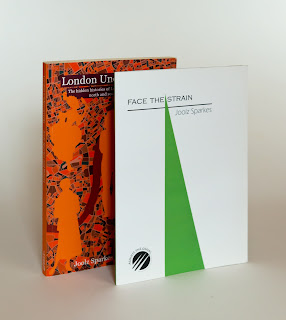Today's poem
published by AGAINST THE GRAIN POETRY PRESS
(ISBN: 978-1-73-916840-7) £6.00
This pamphlet FACE THE STRAIN is written by the Londoner poet Joolz Sparkes, born and raised in the UK. As in the poetry book London Undercurrents (written with Hilaire), the verse stage in the pamphlet is set in London with love and hate. The title serves as a metaphor for Sparkes’s daily life there as a working woman. I, as a freelance translator, can strongly sympathize with her works and feel keenly what she is fighting in society.
The collection covers various forms, i.e., formal poem (‘We’re trying to stop, honest’ with rich cacophony) to concrete poem (‘No title’ with irony). Through it, the current social issues such as diversity and gender are expressed with her own lyricism. From that perspective, it includes works that could be described as political, reiterated as in the previous book.
What is most impressive for me is ‘O World, who shall we be now?’. The poem is after the Japanese poet Noriko Ibaragi’s “When I was at my most beautiful“ (わたしが一番きれいだったとき). In individual stanzas, the line “When we were at our most …” immediately reminds me of Ibaragi’s poem title as anaphora. In addition, each stanza is a snapshot as verse with a critique of society or mankind, echoing her thoughts. Japanese people of a slightly older generation remember Pete Seeger's English translation music. Alternatively, not a song, there is a brilliant translation of Noriko Ibaragi by Andrew Houwen and Peter Robinson. (Noriko Ibaragi, Your Own Sensitivity: Selected Poems trans. Andrew Houwen and Peter Robinson will be published by Two Rivers Press in 2023 https://bit.ly/3HnRVjA).
O World, who shall we be now?
When we were at our most loving,
tube escalators were snogging couples
and no one got knifed on London Bridge.
When we were at our most hopeful,
change rolled statues to the dockside
and every slaveowner was you and me.
When we were at our most disappointing,
VIRUS was an acronym for poverty
and the people we threw away were essential.
When we were at our most deadly,
masks were anxious smiles
and everyone was dying for a hug.
When we were at our most stupid,
vehicles were carbon depletions
and everyone was a frequent flyer.
When we were at our most destructive,
life was a continuation of all that went before
and nothing changed for anyone.
Moreover, I would like to tell about my favorite poem ‘Notes on a table’. The brief poem seems to be a thread of scribblings or fragments. With such an expression, I imagine her missing, mixed feelings on a table at a pub like THE ALBION in Islington.
Notes on a table
In red biro on the surface
someone has scribbled:
Tax year 2011/12.
I can feel your empty chair
pushed to one side,
your goodbye, hanging.
A mundane defacement.
Our last meal,
such casual vandalism.
The last poem ‘the loop will go on’ represents the circulation of the life of human beings. Here, for me, French philosopher Simone Weil’s saying ‘The future is made of the same stuff as the present.’ is overlapped with the poem. The last word “and” indicates “non full-stop” or “to be continued”, that is, getting better or worse depends on us. Sure, her life and poetry will go on.
